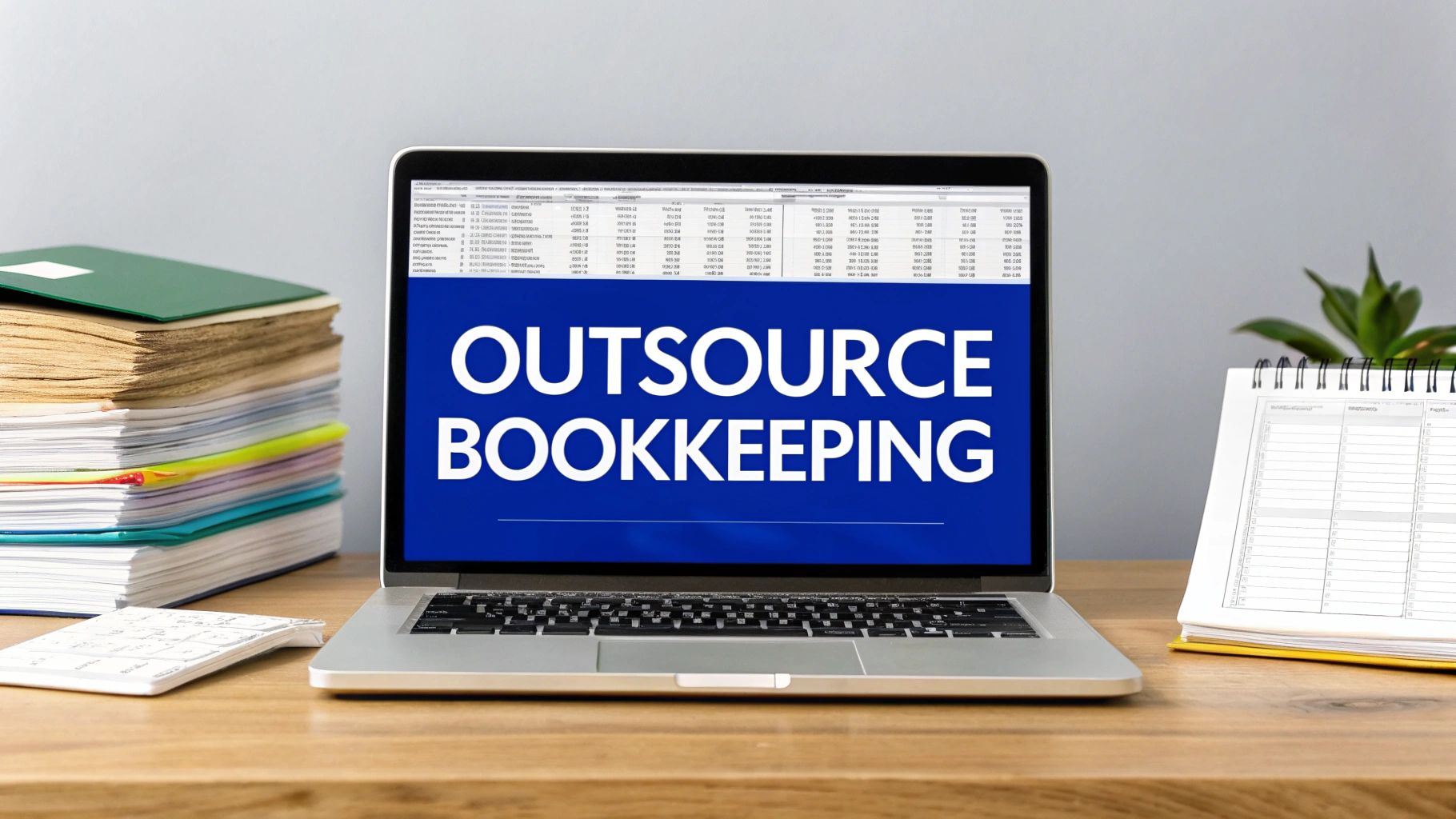Handing over your financial records to an external company might sound daunting, but an outsource bookkeeping service is essentially a strategic move to bring in expert help. It means delegating critical tasks—like recording transactions, reconciling bank accounts, and preparing financial reports—to specialists. This frees you and your team to focus on what you do best: growing the business.
So, What Is an Outsource Bookkeeping Service, Really?

Think of it less like hiring a vendor and more like bringing a specialist onto your crew. You wouldn't try to wire a new office building yourself; you'd hire an expert electrician to avoid costly, dangerous mistakes. An outsourced bookkeeper is that financial specialist for your business, becoming a dedicated extension of your team who keeps their finger on your financial pulse.
At its heart, the service takes care of the day-to-day financial admin that keeps your business compliant and running smoothly. But it’s much more than simple data entry. It’s about building a clear, accurate, and real-time picture of your company’s financial health.
The Core Functions of an Outsourced Bookkeeper
A professional service will typically handle several key responsibilities that form the bedrock of good financial management. These are non-negotiable tasks for any business, no matter the size or industry.
Here’s what’s usually on their plate:
- Transaction Recording: Meticulously logging all income and expenses, ensuring your financial records are always current and correct.
- Bank and Credit Card Reconciliation: Routinely cross-referencing your books with bank statements to spot discrepancies, flag potential fraud, and make sure every penny is accounted for.
- Accounts Payable and Receivable Management: Managing supplier invoices and chasing customer payments to keep your cash flow healthy and predictable.
- Financial Reporting: Generating crucial reports like the Profit & Loss statement and Balance Sheet, which provide the insights you need to make smart decisions.
By handing these jobs to a dedicated professional, you get more than just neat-and-tidy books; you get financial clarity. This clarity is the foundation for sustainable growth, empowering you to forecast accurately, manage cash flow, and make confident strategic moves.
Beyond the Basics: A True Strategic Partnership
The real magic of an outsource bookkeeping service happens when the relationship evolves from a purely administrative one into a strategic one. An in-house bookkeeper might get bogged down recording past transactions, but a top-tier outsourced partner will offer forward-looking advice.
They can help you spot spending trends, highlight opportunities to cut costs, and make sure you’re fully prepared long before tax season arrives. For many UK businesses, this level of expertise is indispensable for navigating complex regulations like Making Tax Digital (MTD) and VAT, turning a necessary chore into a genuine business advantage.
The Real Pay-off: What Outsourcing Your Bookkeeping Actually Does for You
Thinking about outsourcing your bookkeeping? It’s far more than just getting someone else to tidy up your spreadsheets. When you hand over the numbers, you’re actually making a smart move that affects your bottom line, your business flexibility, and your own focus. It's less about offloading a task and more about getting a major upgrade to your entire financial engine.
The benefits really boil down to three things: saving serious money, gaining professional expertise on tap, and winning back your time.
Most business owners I talk to are first drawn in by the financial argument, and it's a strong one. You completely sidestep the hefty costs of hiring an in-house bookkeeper. Remember, that’s not just a salary; you’ve got National Insurance contributions, pension schemes, holiday pay, and training costs to think about. That's before you even get to the price of a desk, a computer, and the software they'll need.
The real value of outsourcing isn't just in what you save, but in what you gain. It's about trading a fixed, often burdensome, employee cost for a flexible, scalable, and expert-driven service that grows with you.
With an outsourced service, you get a predictable monthly expense that matches the support you actually need. No more paying a full-time salary during your quiet months. It just makes sense.
Gaining Instant Expertise and Agility
Let’s be honest, hiring the right person is a slog. It can take weeks, sometimes months, of sifting through CVs, interviewing, and then getting them up to speed. An outsourced bookkeeping service gives you a team of seasoned pros from day one.
This gives you incredible agility. You can ramp up your financial support during a busy season or dial it back down just as quickly. It’s perfect for when you’re launching a new product or navigating a tricky period. This is a huge deal in the UK right now, where finding good people is tough. In fact, a recent report found that 47% of UK accounting practices struggled to fill bookkeeping roles in the last year.
By outsourcing, you neatly sidestep that entire headache. You get instant access to experts who live and breathe UK-compliant software like Xero and Sage, and who are always on top of the latest rules like Making Tax Digital (MTD). If you're curious about how this is affecting UK firms, the team at Corient Business Solutions have a great analysis.
Reclaiming Your Most Valuable Asset: Your Time
This might just be the most important benefit of all. When you're not stuck reconciling bank statements or chasing down invoices, you get your focus back. You can finally put your energy into the things that actually grow your business.
Think about what you could do with that reclaimed time:
- Drive Growth: You could be out there focusing on sales, marketing, and bringing in new business.
- Look After Clients: You’d have more time to spend making sure your customers are happy and well-served.
- Innovate: You could finally work on that new product idea or figure out how to improve your internal systems.
At the end of the day, outsourcing your bookkeeping is a strategic choice. It's about deciding to invest your time where it delivers the biggest return, letting you lead your business with real clarity and confidence.
Deciding If Outsourcing Is Right for You
Thinking about handing over your bookkeeping can feel like a big step. But honestly, it usually boils down to a few tell-tale signs. If you're on the fence, a quick check-in with your business realities can make the decision much clearer. It’s less about how big your company is and more about the challenges you're facing right now.
Take a look at your typical week. Are you or your team constantly being pulled away from what you do best—talking to customers, developing new products, or driving sales—to wrestle with invoices and spreadsheets? That's the number one red flag. If bookkeeping is eating up more than a couple of hours of your week, that's precious time you could be using to actually grow your business.
Key Indicators It's Time to Outsource
Do any of these scenarios hit a little too close to home? If you find yourself nodding along to even one or two, bringing in an outsourced partner might just be the smartest move for your company's financial health and sanity.
- You're Growing Quickly: When business is booming, so is the paperwork. More customers mean more invoices, more payments, and more complex payroll. If your financial admin is starting to feel like a bottleneck, it can seriously hamper your growth.
- Financial Reports are Unclear or Late: Can you confidently say you know your exact cash flow situation right now? If getting clear, up-to-date financial reports is a struggle, you're essentially flying blind when making crucial business decisions.
- You Lack In-House Expertise: Maybe you're doing the books yourself, or you've passed the job to someone on your team who isn't a trained accountant. This is a risky game, as it opens the door to expensive mistakes and falling foul of UK compliance rules.
- You Need to Reduce Overheads: Taking on a full-time, in-house bookkeeper is a major financial commitment. It’s not just the salary; you've got to factor in National Insurance, pension contributions, holiday pay, and equipment. Outsourcing gives you access to top-tier expertise for a fraction of that cost.
This decision tree breaks down how an outsource bookkeeping service helps you save money, gain expertise, and get your time back.

The real takeaway here is that outsourcing isn't just a single solution; it delivers a powerful mix of financial, operational, and strategic wins all at once.
In-House vs Outsource Bookkeeping Service: A Direct Comparison
Weighing up whether to hire someone directly or partner with an external service? This table lays out the key differences to help you see which model is a better fit for your business needs and budget.
Ultimately, the choice depends on your specific circumstances. An in-house bookkeeper offers a dedicated presence, but outsourcing often provides greater flexibility, deeper expertise, and better value for money, especially for small and growing businesses.
Who Benefits Most from Outsourcing
While almost any business can gain something, a few types of companies are practically made for this model. Startups, for instance, need a rock-solid financial footing from day one but rarely have the cash for a full-time salary. Likewise, established SMEs looking to become more efficient find that outsourcing is a key that unlocks new potential. Digging into the advantages and disadvantages of outsourcing can give you a really balanced perspective.
The bottom line is simple: if managing your finances has become a drain on your energy rather than a tool for growth, it’s time to call in a specialist. It’s a strategic shift that frees you up to focus on what you’re truly passionate about.
How to Choose the Right Outsourcing Partner

Choosing a bookkeeping partner is probably the most important decision you'll make in this entire process. You’re not just hiring someone to crunch numbers; you're handing over the financial pulse of your business. The real goal is to find a strategic ally who can offer genuine insights, not just a service that ticks boxes.
This means you need to look past the shiny sales pitch and really dig into a few non-negotiable criteria. For any UK business, that starts with proven, in-depth expertise in our local regulations. They absolutely must be fluent in the language of HMRC, from Making Tax Digital (MTD) right through to the nuances of VAT.
This isn't just a nice-to-have; it's essential. The UK bookkeeping industry is expanding as more SMEs hand off their financial tasks, with revenues expected to climb to around £6.8 billion shortly. This growth has created a crowded marketplace, making it vital to find a partner who truly gets the local landscape. You can read more about these UK bookkeeping industry trends and see why this kind of expertise matters so much.
Vetting for Technical and Security Excellence
Your potential partner needs to be a wizard with the cloud accounting software you’re already using, whether that’s Xero, QuickBooks, or Sage. This isn't just about knowing their way around the dashboard; it’s about mastering the platform to give you a clear, real-time picture of your finances. Don't be afraid to ask them to show you their experience with your specific software.
Just as critical is their approach to data security. You're about to share highly sensitive financial data, so their security measures have to be watertight.
Here’s what you need to probe:
- Data Encryption: How do they protect your information, both when it's sitting on their servers and when it's being sent back and forth?
- Access Controls: Who on their team gets to see your data? What are their permission levels, and how are they managed?
- Compliance: Can they prove they are fully compliant with UK data protection laws, particularly GDPR?
Choosing an outsource bookkeeping service is like picking a co-pilot for your business. You need someone with the right technical skills, a clear map of the regulatory terrain, and a reliable communication system to ensure you both reach your destination safely and efficiently.
Asking the Right Questions Before You Commit
Once you're happy with their technical and regulatory chops, it’s time to find out what the day-to-day partnership will actually look like. The answers you get here will tell you if their working style truly fits with your business. For a more detailed look, check out our guide on what to consider when outsourcing accounting and finance.
Before you even think about signing a contract, get clear answers to these questions:
- Communication Rhythm: How often will you hear from them? Who is your dedicated point of contact?
- Reporting Detail: What kind of reports will you get? Can they be tailored to focus on the key metrics that matter most to your business?
- Pricing Structure: Is it a simple flat monthly fee, or are there hidden variables? What’s actually included, and what will cost you extra?
- Client References: Can they put you in touch with a few current clients, ideally in a similar industry?
A transparent, confident partner will have no problem with these questions. In fact, they should welcome them. Their answers will give you the final pieces of the puzzle, helping you find a firm that truly feels like an extension of your own team.
Weaving Your New Bookkeeping Team into the Fabric of Your Business

Bringing an outsource bookkeeping service on board might feel like a huge leap, but a top-notch partner will make the whole process feel surprisingly effortless. The secret lies in a well-thought-out onboarding plan that breaks down the complexity into manageable, straightforward steps. Think of it less as a handover and more as a guided merger.
The journey usually kicks off with a discovery call. This is where your new team gets to grips with the financial pulse of your business. From there, they’ll handle the secure and organised transfer of all your financial data. You won't be left to figure this out alone; a good firm will walk you through every stage, prioritising security and accuracy from day one.
The real aim of integration is to make your outsourced bookkeeper feel like a natural extension of your own team, not just a contractor you email once a month. You know you've succeeded when communication is easy and working together feels completely natural.
This kind of collaborative spirit is built on a foundation of shared systems and open communication. With modern cloud-based tools, everyone works from the same playbook, making your new financial partner feel as if they’re just down the hall.
Laying the Groundwork for a Smooth Start
A bit of prep work can make the transition painless for everyone involved. Getting clear protocols in place right from the start heads off any potential confusion and helps build a solid working relationship. This proactive mindset is a cornerstone of effective remote employee onboarding and paves the way for a successful partnership.
Here are a few practical tips to get you started:
- Appoint a Main Point of Contact: Choose one person from your team to be the primary liaison. This focuses all communication and stops your new bookkeeper from getting mixed messages from different people.
- Map Out Your Workflows: Decide exactly how routine tasks will be handled. Who needs to submit receipts? Who approves invoices? What are the deadlines?
- Set a Communication Rhythm: Agree on how often you'll connect. Will it be a weekly email summary, a quick monthly video call to go over the reports, or something else?
Putting these simple structures in place creates a seamless connection, empowering your new bookkeeping partner to hit the ground running and deliver real value to your business.
The Future of Outsourced Bookkeeping
The world of financial outsourcing is changing fast. If your mental image of a bookkeeper is someone hunched over a pile of receipts, manually typing everything into a ledger, it's time for an update. That picture is becoming a relic of the past.
Today's top-tier outsource bookkeeping services are tech-first financial partners. They do much more than just keep your records straight; they bring sophisticated tools and strategic thinking to the table.
This entire evolution is being driven by automation and artificial intelligence (AI). Smart software now takes on the repetitive, everyday tasks—like categorising transactions, reconciling bank statements, and pulling together standard reports—with incredible speed and precision.
But this isn't a story about robots replacing people. It's actually the opposite. By letting technology handle the grunt work, expert bookkeepers are freed up to focus on what really matters: providing high-level financial guidance. They're shifting from being simple record-keepers to becoming indispensable strategic advisors.
From Data Entry to Strategic Insight
A modern outsourced bookkeeper doesn't just process numbers; they interpret them. They analyse the data gathered by automation to spot trends, identify growth opportunities, and flag potential financial risks before they spiral into major problems.
This means you get real-time insights that empower you to make quicker, smarter decisions for your business.
Instead of just getting a backward-looking report on last month's performance, they can help you with forward-thinking activities like:
- Cash Flow Forecasting: Giving you a much clearer, more reliable picture of where your finances are heading.
- Budgeting and Planning: Helping you create realistic financial targets and, more importantly, a plan to hit them.
- Performance Analysis: Pinpointing exactly which products, services, or departments are driving your profitability.
This proactive approach transforms bookkeeping from a necessary but dull chore into a powerful tool for growth. It’s all about using your financial data to actively guide your company towards a more profitable future.
The future of outsourced bookkeeping is a true partnership model. Technology handles the mechanics, while human experts provide the strategic wisdom. This blend gives you the best of both worlds: flawless accuracy and intelligent financial guidance.
A New Approach to Pricing and Value
This fundamental change in service is also shaking up how providers price their work. The traditional bill-by-the-hour model just doesn't make sense anymore when automation can complete tasks in a fraction of the time.
As a result, the industry is moving towards value-based pricing. This approach ties the cost of the service to the results and strategic value it delivers, aligning your bookkeeper’s success with your own.
Gartner predicts that soon, a staggering 60% of finance and accounting outsourcing contracts won't be renewed simply because they’re stuck on outdated, headcount-based pricing. As business owners see routine tasks being automated, they rightly demand pricing that reflects the strategic input they’re receiving. You can see more data on how this trend is affecting the business process outsourcing market in the UK.
Ultimately, this shift ensures you're paying for meaningful outcomes, not just hours clocked.
Got Questions? We’ve Got Answers
Thinking about handing over your books often brings up a few common questions. It’s completely natural to want to know more before you make a move. Let's walk through some of the most frequent queries we hear from business owners just like you.
What’s the Real Cost of Outsourcing My Bookkeeping?
This is usually the first question on everyone's mind, and the answer is that it varies – but it’s almost always a smarter financial move than hiring someone full-time. Most bookkeeping services work on a fixed monthly fee, which is based on how many transactions you have and how complex your accounts are.
This approach gives you predictable costs without the hefty price tag of an in-house salary, not to mention National Insurance, benefits, and training expenses. For a typical small business, you could be looking at anything from a few hundred to a couple of thousand pounds a month, with the flexibility to scale up as your business grows.
How Can I Be Sure My Financial Data is Safe?
Handing over sensitive financial information can feel daunting, but any bookkeeping firm worth its salt puts data security at the top of its list. They often have more sophisticated security systems in place than a small business could manage on its own.
Before you commit to anyone, you should absolutely grill them on their security measures. Don't be shy about asking specific questions. Key things to look for include:
- Data Encryption: Is your data protected while it’s being sent and while it’s stored?
- Access Controls: Who in their team gets to see your financials, and what are their access rights?
- Legal Compliance: Do they strictly follow UK data protection laws, like GDPR?
A great partner will be completely open about how they keep your information safe and will have no problem walking you through their processes.
Peace of mind is non-negotiable. Your financial partner should guard your data with the same rigour as a high-street bank. Don't settle for anything less.
What's the Difference Between a Bookkeeper and an Accountant Anyway?
This is a fantastic question, and getting the distinction right is key. Think of your bookkeeper as the person on the ground, dealing with the daily financial details. Their job is to meticulously record and categorise every transaction, making sure your financial records are spotless, current, and compliant.
An accountant, on the other hand, operates at a higher altitude. They take the beautifully organised data from your bookkeeper and analyse it to offer strategic advice, handle complex tax returns, and help you plan for the future. While many firms do both, bookkeeping is the bedrock. You can't have good accounting without it.
Here’s a simple way to see it: the bookkeeper writes the detailed story of your business, day by day. The accountant reads that story and helps you decide what the next chapter should be.

